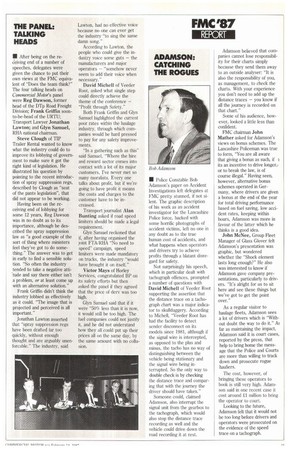ADAMSON: CATCHING THE ROGUES
Page 33

If you've noticed an error in this article please click here to report it so we can fix it.
IN Police Constable Bob Adamson's paper on Accident Investigations left delegates at FMC pretty stunned, if not silent. The graphic description of his work as an accident investigator for the Lancashire Police force, backed with some horrific photographs of accident victims, left no one in any doubt as to the true human cost of accidents, and what happens when operators and drivers try to achieve profits through a blatant disregard for safety.
Not surprisingly his speech, which in particular dealt with tachograph offences, prompted a number of questions with David Michell of Veeder Root supporting the assertion that the distance trace on a tachograph chart was a major indicator to skullduggery. According to Michell, "Veeder Root has had the facility to detect sender disconnect on its models since 1981, although if the signal wire is intercepted, as opposed to the plus and minus, the tacho has no way of distinguishing between the vehicle being stationary and the signal wire being interrupted. So the only way to double check is by checking the distance trace and comparing that with the journey the driver should have taken."
Someone could, claimed Adamson, also interrupt the signal unit from the gearbox to the tachograph, which would also stop the distance trace recording as well and the vehicle could drive down the road recording it at rest. Adamson believed that companies cannot lose responsibility for their charts simply because they send them away to an outside analyser: "It is also the responsibility of you, as management, to check the charts. With your experience you don't need to add up the distance traces — you know if all the journey is recorded on that chart."
Some of his audience, however, looked a little less than confident.
FMC chairman John Mather asked for Adamson's views on bonus schemes. The Lancashire Policeman was true to form, "You are all aware that giving a bonus as such, if its an incentive to drive longer,' or to break the law, is of
course illegal." Having seen, however, alternative bonus schemes operated in Germany, where drivers are given a bonus at the end of the year for total driving performance based on fuel saving, low accident rates, keeping within hours, Adamson was more in favour of the latter which he thinks is a good idea.
John McNee, Group Fleet Manager of Glass Glover felt Adamson's presentation was graphic, but wondered
whether the "Shock element lasts long enough?" He also was interested to know if Adamson gave company presentations, particularly to drivers. "It's alright for us to sit here and see these things but we've got to get the point over."
As a regular visitor to haulage fleets, Adamson sees a lot of drivers which is "Without doubt the way to do it." AE far as maintaining the impact, Adamson said it is court cases, reported by the press, that help to bring home the message that the Police and Courts are more than willing to track down and prosecute rogue hauliers.
The cost, however, of bringing these operators to book is still very high. Adamson said in one recent case it cost around El million to bring the operator to court.
Looking to the future, Adamson felt that it would not be too long before drivers and operators were prosecuted on the evidence of the speed trace on a tachograph.




















































































